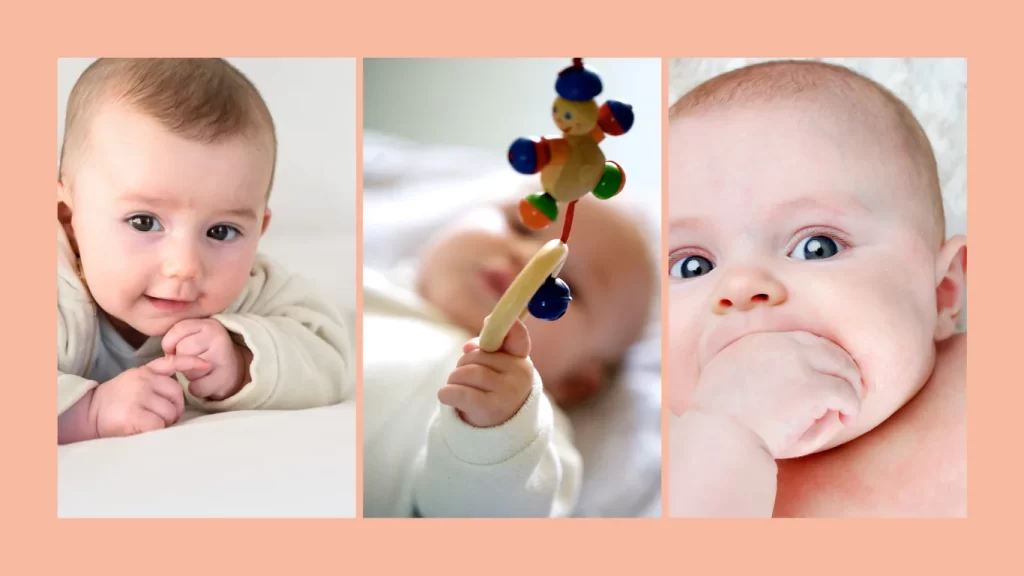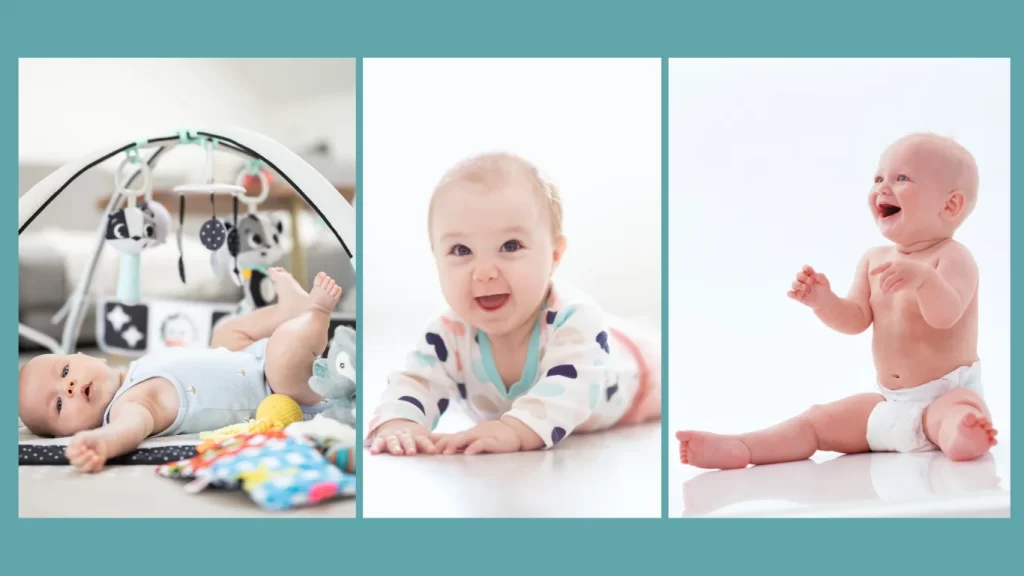In just 12 short months, your newborn undergoes many changes. Every month brings its own developments and learning opportunities. Parents are always excited for the next development milestone. While all babies develop at different stages, there is a general window of when babies should be rolling over, sitting up, clapping, etc. Throughout this article, we will discuss baby milestones from birth to 12 months. However, it’s important to remember that every baby is different; if your baby is ahead or behind that, that’s okay.
What are baby milestones?
Developmental milestones are skills your baby masters throughout the first few years of life. Milestones are split by approximate age ranges and are usually grouped into a few categories: motor skills, cognition, language and communication, and social-emotional.
Motor skills refer to your baby’s physical development, such as sitting, walking, rolling over, etc.
Cognition applies to brain development, like learning, problem-solving, thinking, etc.
Language and communication refer to hearing and understanding, expressing feelings through language, etc.
Lastly, social-emotional refers to your child’s emotional understanding.
Throughout this article, we will discuss milestones divided by months for the first year of a baby’s life. Milestones are guides rather than strict rules. The windows in which we discuss are the estimated time children learn the mentioned skills; however, they are flexible.
Check out our article on Sleep Regression.
Baby Milestones By Month
One to Three Months
The first three months of a baby’s life are when the brain and body of your newborn are learning to live outside the womb. This stage includes lots of eating, sleeping, and, of course, crying. Milestones you can pick up during these first three months will be pretty mild but exciting.

Smiling: You may see your baby crack a smile during naps or wake time, but not necessarily in response to you. They will react to your smiles and talking at an age closer to three months.
Holding Head Up: As we all know, tummy time is essential at this age, and the more you do, the better they’ll become at keeping your head up. Tummy time also counts if it’s on your chest, couch, bed, or play mat.
Discover Their Hands: They will begin to discover their hands, open and shut them, and they may even bring their hands to their mouths.
Grip: Closer to three months, they will try to grip toys and objects hard.
Four to Six Months
This is the age when your baby will perfect using their hands. They will also discover their voice at this age and make good use of it.

Rolling Over: This is the rolling over stage. All that practice tummy time has now transformed into a new milestone.
Babbling: Baby language is a favourite of many. This is when your baby will likely discover they have a voice, and they will start to babble.
Laugh: Your baby will advance from smiling to laughing.
Reach: They can now reach out and grab toys on the mobile or the ones hanging from their play gym.
Sitting Up: They will likely be able to sit up, although a little shaky. (practice makes perfect)
Seven to Nine Months
During this stage, you better be prepared, if you haven’t babyproofed yet, then it’s time.
Crawling: There are some variations of crawling, and any one of the is considered a pass: scooting, Army crawling, and standard crawling on hands and knees.
Sitting Upright: At this age, your baby will be able to sit up without your support.
Responding: They will begin to respond to their name and other familiar words. Such as no, mama or dada.
Clap: Their motor skills will be advanced enough for them to clap and play the patty cake song or even cover their eyes for a peekaboo game with their siblings.
Pull up to Stand: Your baby will pull to stand in their crib, by the couch, or anything else that they can reach.
Ten to Twelve Months
This is the last developmental stage of your baby’s first year of life. Your baby is transitioning from a baby to a toddler.
Eating Alone: Your baby will enjoy eating her food by her own via the “pincer grasp.”
Cruising: They will start to cruise around the house with the help of objects or furniture.
Talking: Although not fluently, they will start to say their first words, such as mama, dada etc.
Pointing: Being that they can’t communicate greatly, they will point at things that they want.
Copy: They enter the funny stage of copying what you say or do.

First Steps: This will usually occur when they turn one, but every baby is different; it can also happen before or after.
Conclusion – Baby Milestones
Milestones are an essential factor in your baby’s overall development. This article reviewed some general baby milestones for the first year. The first year comes with the most changes and growth. After all, your baby is getting used to life outside your womb after nine whole months. The first few months are challenging; however, you can expect a big change once they reach the six-month mark. It’s important to remember that these baby milestones are a rough estimate of when they should occur. Each baby is different, and milestones can come a little later or earlier for some.
When can I expect my baby’s first laugh?
Babies will usually begin to laugh at 3 to 4 months of age.
When do babies start to get teeth?
Teething usually starts at 4 to 6 months. Some babies don’t cut teeth until later, but typically, it begins at four months.
What is a red flag in baby milestones?
Certain red flags could be a cause for concern: Lifting or grabbing toys with only one hand, drooling excessively that doesn’t require much effort, trouble with fine motor skills, etc.
How do milestones affect premature babies?
A baby born before 37 weeks will reach milestones according to their due date, not the day they were born. For example, if your child was born six weeks early, they will reach the developmental milestones six weeks later, referred to as the “adjusted age.”





